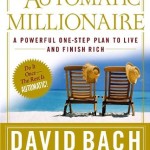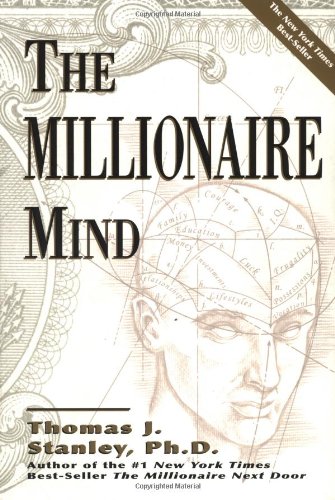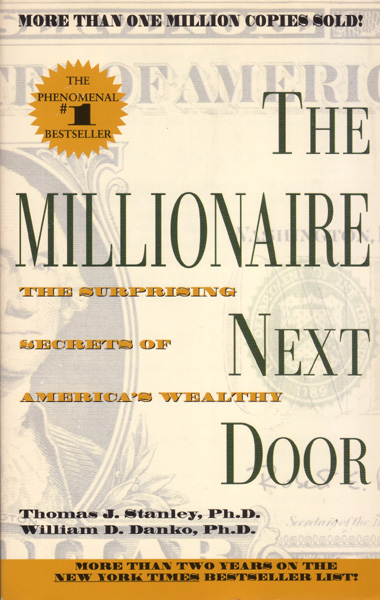A few weeks back I sent out a proposal to a few prospective agents, expecting at least one would recognize the genius – and their own self-interested business opportunity – in my personal finance book proposal.
One prospective agent asked a reasonable question in reply: “What’s the one thing you would like to get across to readers of your book?”
At the time I got his email I was in the process of sitting down to watch a summer blockbuster movie in the theater[1], so I fired off what came into the top of my head, to which he replied:
“Not good enough. You need to give readers something more concrete and memorable, like ‘Bach’s Latte Effect.”
I puzzled over that one throughout the movie, as I did not recall anything about delicious lactose-based caffeinated beverages in my limited knowledge of the Brandenburg Concertos.
Fortunately, when the movie let out I had recourse to The Google.
I learned that one of the most popular personal finance book of the last decade – The Automatic Millionaire: A Powerful One-Step Plan To Live And Finish Rich, by David Bach – makes use of Bach’s Latte Effect as a central, simple concept for getting rich.
David Bach, not Johannes Sebastian, composed the ‘Latte Effect.’
The next day I ordered the book, fully hoping to hate it, all the better to discard the agent’s comment in an ego-protective way.
I’m sorry to say: This book is quite good.
I mean, mine’s better, obviously, but David Bach has the distinct advantage over me of actually having written and published his book. And, it’s got a couple of extraordinarily simple, memorable, easy steps that could help most people get wealthy by the end of their lifetime.
Bach has two, and only two, major points to make, both of which are absolutely correct.
Bach’s first point – The Latte Effect
You do have money to invest.
Nobody thinks they do. Most days I don’t think I do. I mean, the money always runs out first, right? How would I even scrape together an extra $100 a month? It’s just not happening, right? Wrong.

The Latte Effect, coined by Bach, refers to the correct idea that all of us – ALL OF US[2] – are paying for things on a daily and weekly basis that we don’t have to. Each one of us – were we to track every little, literal, expenditure – buys small things that we do not have to buy.
Me, as an embarrassing example of the Latte Effect
Personally I have gotten in the habit of feeding my Starbucks addiction to an embarrassing level. Let’s say I spend $2.50 on a Grande per day,[3] for a total of $17.50 per week. And let’s say three times a week I grab a ‘classic sandwich’ for breakfast from that smug little green mermaid because I’m in a rush to drop off the girls at school or camp or whatever for a total of $12 more dollars per week. So I spend $29.50 per week at Starbucks.
So, sue me, what’s the big deal?
The big deal is that this tiny little forgettable expenditure, after 52 weeks, comes to $1,534 per year.
And the next big deal is what I’m not building in long-term wealth by spending that $1,534 annually.
How big is the Latte Effect?
Let’s say I saved and invested an additional $1,534 per year in the stock market, and let’s further say I did that for the next thirty years, until I turned 72. How much richer would I be?
Plug this into your compound interest calculators everybody:
At a plausible 6% return from the markets I’d be more than $128 thousand richer by age 72.
At a backward-looking, historically-realized 10% return I’d be more than $277 thousand richer.
What if instead of getting wise at age 42, I had cut out my destructive Starbucks habit and began my caffeine-free living at age 22? Now this gets really interesting.
At the plausible rate of 6% return from the market, I would end up at the age of 72 $472 thousand richer. And if markets returned as much as 10% every year I would be over $1.9 million richer.
So what is my Latte Effect?
Over my working lifetime (age 22 to 72) somewhere between $472 thousand and $1.9 million. Actually I am certain the range of the effect is much higher, as I’ve underestimated both my weekly Starbucks consumption and other unnecessary consumption items, but you get the idea. I should be, and could be, much wealthier.
And so could you. So what’s your Latte Effect?
Your Latte Effect
Now, you may be feeling quite smug because you’re Mormon and you never touch the Starbucks poison. Good for you. You still have a Latte Effect. I guarantee it.
You buy lottery tickets. Or gum. Or tic-tacs. Or Spotify/Pandora. Or Netflix/Hulu/AppleTV. Or internet porn. Or extra leveling-up manna on the Freemium games for the iPhone. I know you have a weakness, you’re just not telling me.
Which is fine. But you should be honest with yourself about your own Latte Effect, if you aren’t coming up with money at the end of the month to invest for your long-term financial security.

Bach’s second point: Automate the Investing
Not only do we not think we have any money at the end of any month, but very few of us – even if we had the money at the end of the month – have the willpower to turn it over to our long-term investment accounts.
The only surefire way to invest – and here I have to give Bach credit for totally nailing it, although also of course I independently urged people to do this last year[4] – is to set up automatic deductions from your checking account (or better yet, directly from your paycheck) into your investment accounts.
[Why does this work? I don’t know. It has something to do with the idea that money that either doesn’t stay in our checking account – or doesn’t even hit it – is money that we will not be tempted to spend. Humans are weird psychological puzzles when it comes to money. Incidentally, here’s a good book I reviewed that explores all the different irrational things we do with money. Ok, back to our regularly scheduled program.]
The following statement – a paraphrase of Bach’s book – deserves the bold, italic, underlined all-caps designation I’m giving it.
THE MOST IMPORTANT STEP YOU CAN TAKE TO BECOMING RICH IN THE LONG RUN IS TO AUTOMATE YOUR MONTHLY INVESTMENT CONTRIBUTIONS
I’ll stop shouting now, and offer a few additional calm thoughts.
- The first best place to automate investment contributions is to your 401K and IRA, both of which are tax-advantaged, awesome investment vehicles.
- If you already contribute to your company’s 401K (or 403b for non-profit folks), then check to make sure you are maximizing your annual contributions.
- Your friendly bank or brokerage company will happily set up a monthly or bimonthly automatic transfer from your checking account into the investment account you open there.
- If you’re just starting out and don’t think you qualify for the investment to open an account, you can sometimes convince them to waive the minimums, if you set up an automatic investment program.
- If you’ve never invested before, try dedicating just 1% of your income to your investment accounts through automatic investing. Over time, once you’ve automated contributions, you will see that moving to 5%, and then 10%, of your income is no big deal.
Automatic investing this way is not simply a way to invest, or one way to invest. No. I say with confidence it’s the ONLY way to invest. If you haven’t tried this, but have always wondered how other people actually invest money over time, you may be amazed to learn that the vast majority of people did it, one way or another, based on automatic investing.
So, the TL;DR on David Bach’s book:
You could have money left over at the end of the month if you stop drinking lattes (or whatever), and you could become wealthy if you automatically made contributions to your investment accounts, starting with your tax advantaged retirement accounts.
Caveats
I have only two caveats about The Automatic Millionaire, and these caveats apply to every single personal finance book I’ve ever read so far.
Who buys this?
First, the type of person who picks up a personal finance book is already different from your average person who needs help with their finances. A personal finance book buyer has self-selected as someone oriented toward financial self-improvement, and asking for outside ideas. Will buyers and readers of The Automatic Millionaire follow Bach’s advice? I hope so. Will the people who need the book the most actually end up buying it, in order to take their first few simple steps toward financial security? I don’t know.
Compound interest
My second caveat is just my personal pet peeve. Bach makes good use of the concept of compound interest, urging his readers to invest early in their lives to get rich later. Multiple charts and tables in the book show how a few thousand dollars invested, for X years, earning Y% return, will result in Z riches. This is great.
BUT!
Bach, like every other personal finance author who has ever been published, declines to show exactly how the math is done. He decided, the same way every other publisher has previously decided, that book readers cannot be trusted to learn a simple algebraic formula.
With a little attention and a simple spreadsheet, readers should be taught compound interest. Am I the only person who thinks that personal financial advice starts with people understanding compound interest well enough to do the calculations themselves, rather than refer to somebody else’s table in a book?
Apparently, yes.
If I ever spoke with that agent again, I’d like to tell him that the one thing people should understand is the compound interest formula. That is my most firmly held belief.[5]
But I’m afraid it’s not something the publishing world is comfortable with. They don’t trust readers enough to walk them through the junior-high level math. So we get tables and charts instead.
Please see related post All Bankers Anonymous reviews in one place!
Please also see related posts on:
[1] 22 Jump Street, if you must know. What? Whaaaat? My wife tells me Channing Tatum is quite a good actor. But I still haven’t convinced her to start calling me “Magic Mike.” I don’t know why she refuses me this simple courtesy.
[2] Ok, obviously not all of us. Because there is real poverty everywhere. And I know there is food insecurity within a few blocks even of my own house, so I should not exaggerate. But many, many, many, more of us – pretty much anybody who is gainfully employed right now and not on complete federal assistance – has their own Latte Effect were they to examine their daily habits scrupulously.
[3] I happen to know my Starbucks habit is much, much worse than this, but I’m not about to confess this to just anyone on the Interwebs. I mean, I have some pride. Also, there are some crazies on the Interwebs, have you noticed? Sheesh.
[4] I’m just bragging here so that any book agents reading this know that I’m totally all over this topic.
[5] That, and also the firmly held belief that Rihanna would totally prefer me over both Drake and Chris Brown, if she was ever given the opportunity. Sorry, RiRi, I am happily married.
Post read (3325) times.






